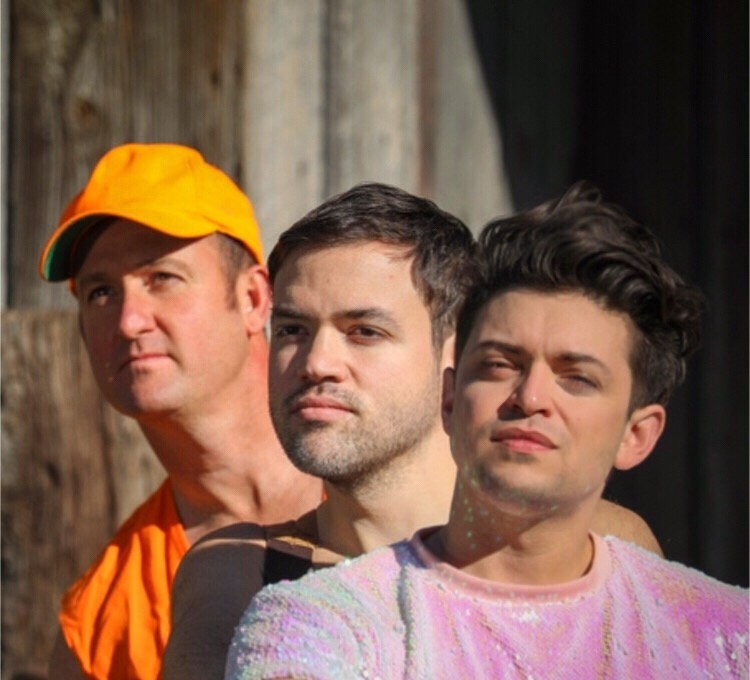
While a quick Google search turns up such events as the Gay Ole Opry, begun in 2011, the subgenre of queer country music has been dominated by one artist, Phranc, for the last three decades. There are a handful of stars who have come out—namely Chely Wright, Brandy Clark and Ty Herndon—but the Nashville music scene is still, uh, dominated by straight guys in blue jeans.
Next week, Memphis group the Dixie Dicks throw their proverbial hot pink cowboy hats into the ring with the release of an EP, Vers. A record release party, labeled “Love Sucks and So Do the Dixie Dicks,” will take place at Bar DKDC on Valentine’s Day—Wednesday, February 14—at 9 pm. Produced by Kevin Cubbins at Pansy Foote Studio, 300 copies of the EP will be available on pink vinyl.
There is nothing average about the Dixie Dicks, although their self-deprecating demeanor onstage would have you think otherwise. Their musicianship, which harkens back to the folksy, bluegrass style re-popularized with the release of 2000’s O Brother, Where Art Thou?, is top-notch. Lyrically, Vers is a hoot, jam-packed with sing-a-longs about how “No one likes lesbian drama” or double-entendres like “You call me daddy while I feed you this meat.” Rather than sides A and B, the vinyl is labeled sides Top and Bottom. Get it?
I caught up with guitarist Brandon Pugh and percussionist Joel Parsons earlier this week (banjo player Brandon Ticer, who his bandmates declare is the only “real” musician in the group, was on tour as keyboardist for the New York-based rock band Wheatus).
“It’s fun because we’re all gay, but none of us are hooking up with each other,” said Pugh, who runs the organic Delta Sol Farm in Proctor, Arkansas. “I’m a camp counselor-level guitar player. I love country music, and I love bluegrass music. I still listen to a lot of that late-1980s early ‘90s country that I grew up with. I love Tanya Tucker, the Judds. Miranda Lambert—I’m obsessed with her now. She divorced that Blake Shelton guy, and he’s been a jerk about it. Meanwhile, she’s the last one at the bar—she doesn’t care, and she’s owning her shit.”
Pugh sees performing in the Dixie Dicks as an opportunity to “reclaim the weird stuff that happened to us [growing up], like being gay at a Christian camp.”
Their songs, he said, “are pretty crude—not parent friendly. At rehearsals, we’re cracking each other up. And then whoever says the dumbest, funniest thing, we’ll add it to the lyrics.”
Parsons, an artist and curator who runs the Clough-Hanson Gallery at Rhodes College, maintains that while the Dixie Dicks started as a lark, the band is taking the joke “very seriously.”
“To be completely honest, I know almost nothing about making music.,” Parsons continued. “My dad was a drummer, and I grew up around percussion. Brandon Pugh sustained interest in music in a self-taught way, while Brandon Ticer is an excellent musician who elevates our playing to another level. It’s a nice mix—we don’t get bogged down in arrangements or making it super-slick.”
When recording the EP, the Dixie Dicks wanted “everything to sound like as much fun as we’re having,” Parsons said. “Let’s not get too tight, or too perfect. Let’s leave some flubs and mess-ups and hootin’ and hollerin.’”
Some of his strongest childhood memories, he said, are riding in the backseat of his grandparents’ Lincoln Town Car around his hometown of Rogers, Arkansas, listening to George Jones, Dolly Parton and Reba McIntyre.
“I left that behind, but now I’m able to come back around and flip it,” Parsons said. “I can live inside this music that I didn’t think had a place for me. The Dixie Dicks are really, honestly a hundred percent country and really, honestly a hundred percent queer. Being onstage feels a little bit naughty, which makes it so much fun. Country music is so gay—we have a list of at least 50 songs which just need this word or that word changed to be queer. Like ‘Rock Me Daddy Like a Wagon Wheel’—they write themselves, we just have to tune it and sing it!”
Parson sees the Dixie Dicks as not just a way for him and his fellow musicians to reconcile their own identities as gay men, but as a reclamation of place for any Mid-Southerner who has come out of the closet.
“We have a really good mix of people at our shows: A hardcore contingent of badass middle-aged women, and people who come because it’s a gay thing to do, and a safe place to go. Then we have people who love the songs. I don’t think there’s been a huge country music following among the local [LGBTQ] community, so it’s been fun to watch them embrace their southern side,” Parsons said. “It’s something that a lot of people, including me before this band, have been a little hesitant to do.”
Cubbins, the producer, agreed. “That’s the most brilliant part of it—the Dixie Dicks go beyond one single audience,” he said. “There are so many layers to their songs, so much energy and spontaneity, yet so much attention to detail.”